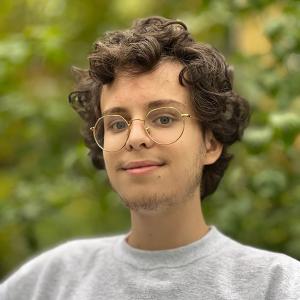I mentioned once that the Environmental Studies class I am taking this semester is not exactly what I thought it was. The caning and hysterical screaming aside, Rumi Shammin is a really original, creative professor (and if you've met him you know how silly it is to think of him raising his voice above a polite 'Okay'). I just assumed the class would be chock full of science detailing the countless ways we humans are using the globe like a praying mantis uses her mate, first enjoying the sinful pleasures of her fruitful nether regions (figuratively 'pumping oil,' or no, actually pumping oil), and then biting her head off and feasting on her for nourishment of our offspring. Figuratively, or maybe--the point is: I need better metaphors.
In actuality, the class is a little bit of sociology and public policy, quite a lot of philosophy and science, and most of all, critical thinking that doesn't really fall into any 'school' category, and feels more like what it must feel like in real life when making decisions about the environment. The class, and the Environmental Studies department, is not Environmental Science, which is the big mistake in assumption that I made going into it. I'm glad I did.
I came to class yesterday with a full-blown cold, sniffling like the coke addict I was back in kindergarten, complete with an ear infection. Ear infections are for toddlers, not sophomores in college with a job teaching swim lessons. Anyway, I hadn't done the assigned readings or even looked at he syllabus to see what we were going to be talking about in class since I had spent 10 hours the previous night getting the best sleep ever, courtesy of NyQuil. When Professor Shammin told us to get into our groups to discuss case studies, then, I was ready to have my arse kicked by unpreparedness (figuratively. Right?). He handed out copies of the background information we were supposed to read the night before, a page front and back with tiny type, and our specific roles in the exercise for today, a one-sided page we were also supposed to read the prior evening.
"Review the background and your part before you meet in your groups. I'll give you three minutes." Cuh-rap.
If Usain Bolt was in class next to me reading this case study as fast as he could in some bizarre case study reading race, I think I could have given him a run for his money Thursday. When the whistle blew, I convened with my group members, still not sure whether my character, Dr. Sujata Gupta, was a man or a woman. I resolved to do my best anyway, and launched into my 3-minute time period to defend my position. As an Indian research scientist, I was concerned for the farmers in India, whose chickpea crops have recently come under attack by the devil's own pod-boring beetle. I had developed a genetically engineered variety of chickpea that was not only resistant to the pod-borers, but also produced more peas for the same amount of water, labor, fertilizer, etc. As far as I was concerned, selling these seeds to farmers at a deep discount was a win-win situation.
This case study was a real situation that had to be debated and discussed in order for it to get funding from a nonprofit organization years ago. The class's last case study explained the dilemma involved with expansion of the Cleveland Hopkins Airport into the neighboring wetlands, which happened right here in 2001. Professor Shammin explained why he likes us to take on roles instead of just discussing issues in class that are purely theoretical: In class, it is okay to discuss problems and solutions and leave class with no resolution and no real consequences. In the real world there are decisions that have to be made, and money that has to be spent (or not spent). We can take our ideals about habitat preservation to infinite limits in the classroom, but when deciding whether or not to expand the airport to make more room for commercial interests, international flights, etc., you have to consider that the city of Cleveland has been suffering for some time now from loss of jobs, loss of industry, and the effects of urban sprawl.
As far as genetically engineered crops went, I was actually convinced that it would be a good idea to sell these seeds to farmers, both as Dr. Gupta and as Joe Dawson. These particular seeds were of no interest to major corporations, would only require a one-time transaction with the farmers, and would not necessitate importing pesticides, the previous method for fighting the pod-borers. As my other group members defended their positions, two of which were opposite mine, I found some aspects of what they said laughable, some reasonable, and some really made sense. A scholarly discussion ensued. We ended up running out of time in class on Thursday to finalize our decision, so we'll have to do that in the first five minutes of class Tuesday.
Regardless, I'll be damned if I didn't actually learn something in class Thursday. Go figure.


